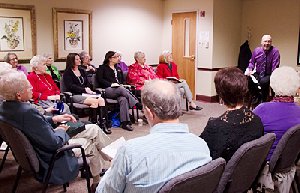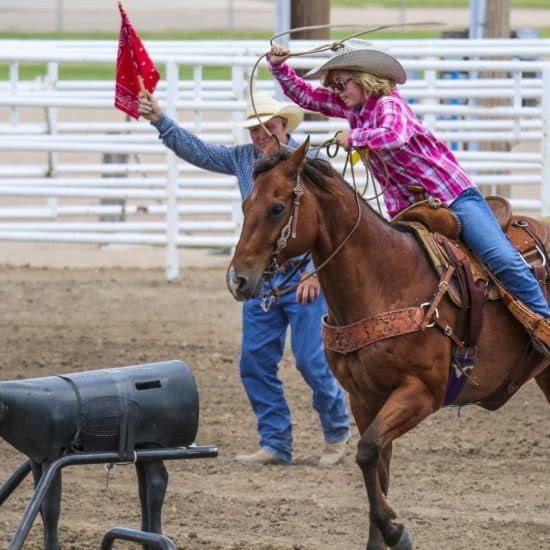Not too long ago, hardly any church would have dared to plan, write and publish its own Bible study materials. Before computers, desktop publishing and easy access to the Internet, the task would have been so daunting, few churches would have had the resources to pull it off. These days, all that has changed.

Associate Pastor Mark Wingfield teaches an intergenerational Sunday School class at Wilshire Baptist Church in Dallas that combines published curriculum resources with materials church members develop themselves. (PHOTO/David Clanton)
|
And a growing number of churches are taking full advantage of these new possibilities. Technological advances have made micropublishing ventures common. And the rising educational level of American church members has created a larger pool of competent writers.
But with the benefits come challenges, not the least of which is finding the energy and commitment to keep at it. For many churches, it's a matter of balancing their needs with available human resources.
When the staff of First Baptist Church in Wilmington, N.C., developed an ambitious strategic discipleship plan that included a six-month journey with Jesus through the four Gospels, its minister of spiritual formation, Jayne Davis, knew the church had a problem.
"Given that we wanted to read through the Gospels in a set timeframe and that we wanted the Sunday School lessons to correspond to the sermon text, we knew that we would not be able to find published materials to meet our needs," she said.
So, the church determined to produce its own.
Four months into its Bible study, church members were so positive about the experience, they decided to continue producing their own material indefinitely. Davis plans and edits a weekly student lesson and daily devotionals written by church members. The study, called Along the Way, is augmented by a teacher's guide Davis writes. Scriptures in the lessons and devotionals correspond to the Sunday sermon text.
Difficulty in finding appropriate material sparked a similar response several years ago from Wilshire Baptist Church in Dallas.
"Our first attempt at writing curriculum started about a decade ago, when we couldn't find preschool and children's curriculum that was age-appropriate and theologically sound," said Mark Wingfield, Wilshire's associate pastor.
"We formed a small task force of veteran educators and Sunday School teachers and set to work. It took months. Ultimately, this was not sustainable, but these actions did carry us through until other commercial curriculum options got better."
Although Wilshire found it impossible to publish comprehensive age-level Bible study literature, it has found some success in developing resources for specific emphases.
"More recently, our strategic planning process has spawned about five specialized curriculum pieces for adults," said Wingfield. "These are three- to five-lesson units addressing areas we wanted to highlight as a congregation, such as evangelism, missions, Baptist heritage and spiritual practices."
The lessons have been well-received, he said, but not all classes have been inclined to use them.
"Most of our adult classes operate quite autonomously,and each class has its own interests," he explained. "Some use standard curriculum, but many do a variety of Bible book and topical studies. Even though strategically we want our classes to use the lessons on evangelism, not many of our classes are lining up to ask for those lessons."
Other churches also have decided to produce their own material for specific kinds of studies. When children's leaders at First Baptist Church in Newport News, Va., met for dinner one evening to evaluate the Vacation Bible School they had just finished, no one could have predicted what happened. Before the meeting concluded, they decided to write their own materials for the next VBS.
While one of leaders had limited experience writing study materials, the others described themselves as "ordinary church members."
Inspired by the belief the children needed a Vacation Bible School focused on the Bible and missions, the church's director of preschool and children's ministries, Susie Webb, and church member Lisa Mason took the lead in producing their own VBS curriculum.
When the national staff of the Cooperative Baptist Fellowship learned of the congregation's plans, CBF offered to partner in producing the materials and making them available to other churches as well.
Don Davidson, pastor of First Baptist Church in Alexandria, Va., realized the church needed to be challenged to reach the lost in its city. After reviewing materials available, he and staff members Bryan Jones and John Copeland came to the conclusion the church needed material that spoke more specifically to the needs of people in the greater Washington area and also took into account the church's culture and its evangelism potential.
Jones and Copeland wrote materials used in Sunday School to emphasize both the place of evangelism in the life of a healthy congregation and their city's need for Christ. The study led to increased intentionality in witnessing and to a rise in the number of baptisms in the church, Davidson said.
Encouraged by their success, Davidson subsequently enlisted Jones and others to help him write spiritual growth materials using Richard Foster's Celebration of Discipline as a platform.
Wilshire also found combining existing books with newly created material could make compelling educational resources.
"Some of our classes create their own curriculum by piecing together various strands over the course of a year," Wingfield said. "The most fully developed of this format is a large adult class that actually has its own curriculum committee. This committee lays out a teaching plan for an entire year at a time, drawing on an assortment of biblical texts, topical issues and thematic arcs. Then they recruit a variety of in-house teachers and guest speakers to flesh out the outline. That's an exception on the high-achieving end.
"Other classes, like the intergenerational class I teach, may use a purchased curriculum part of the time and a self-made curriculum part of the time," he added. "For example, we're beginning a series on Christian ethics that I've outlined for the class and will draw from a variety of resources to create the lessons."
Still, producing curriculum material, especially if it is continual, has its drawbacks, cautions Wilmington's Davis, "A significant amount of staff time is invested in assigning, editing, writing and producing the material," she said. "Like preachers who believe Sunday rolls around every four days, producing your own material is a significant undertaking; as soon as one booklet is done, another is already in the works."
In addition, she said, there is a danger a church will cease to be challenged by ideas from outside itself and depend more and more on its own input. Concern for sound doctrine also must be maintained.
"Writing our own material is not an anything-goes proposition," she said. "Part of my role as editor is to walk a fine line between listening to different voices and interpretations of Scripture and maintaining a healthy orthodoxy for our congregation."
Drawbacks aside, Davis believes the process is worth the effort.
"We can be more intentional about the types of discipleship conversations our people are having," she said. "If there is a topic we need to talk about as a congregation, we can design a series around it. We can help folks to learn more about spiritual disciplines by including them in the teacher's guide when it is appropriate to the text. We can encourage more sharing of faith stories by making that a part of the lesson plan.
"By far, though, the greatest benefit to writing our own materials has been in asking folks to write devotions and lessons and affirming that they have something to say to the church for the building up of the body. That has had a significant impact on the discipleship culture of our congregation."
Wingfield noted churches' concern for quality teaching resources won't go away any time soon, and it crosses denominational lines.
"While traveling the country last year on a sabbatical research project, I visited 15 Protestant congregations that are fairly traditional in their structures and approaches. What I discovered at these Baptist, Presbyterian, Methodist, Lutheran, Congregational and Reformed churches is a huge hunger for quality curriculum options," said Wingfield, whose research is detailed in a book he subsequently wrote, Staying Alive: Why the Conventional Wisdom About Traditional Churches is Wrong.
"Even though there are so many more people publishing curriculum these days, most churches feel like they don't have access to the types of curriculum that fits their needs in a quality way," he added. "This is a problem that reaches way beyond Baptists."
—With additional reporting by Robert Dilday





